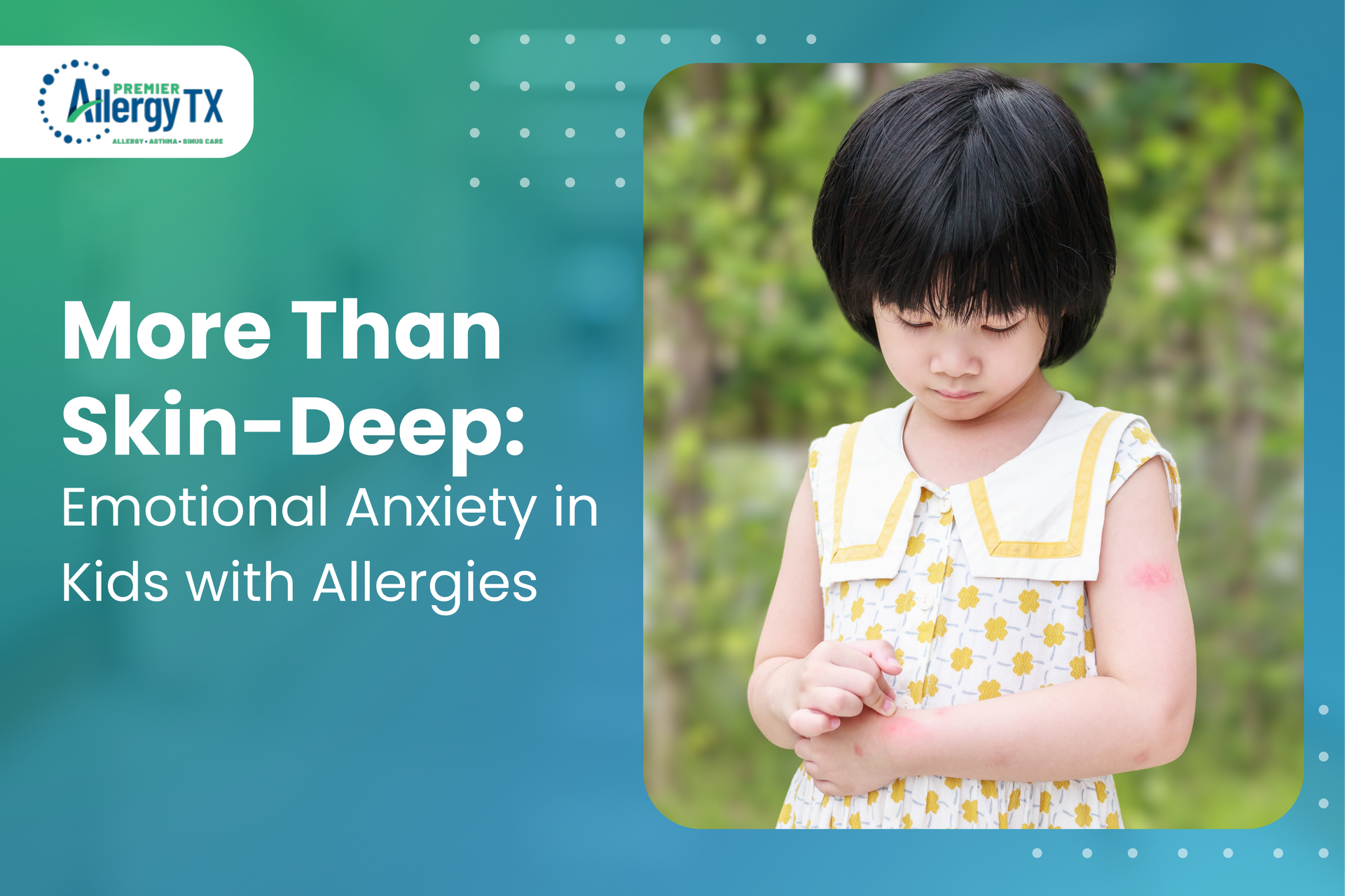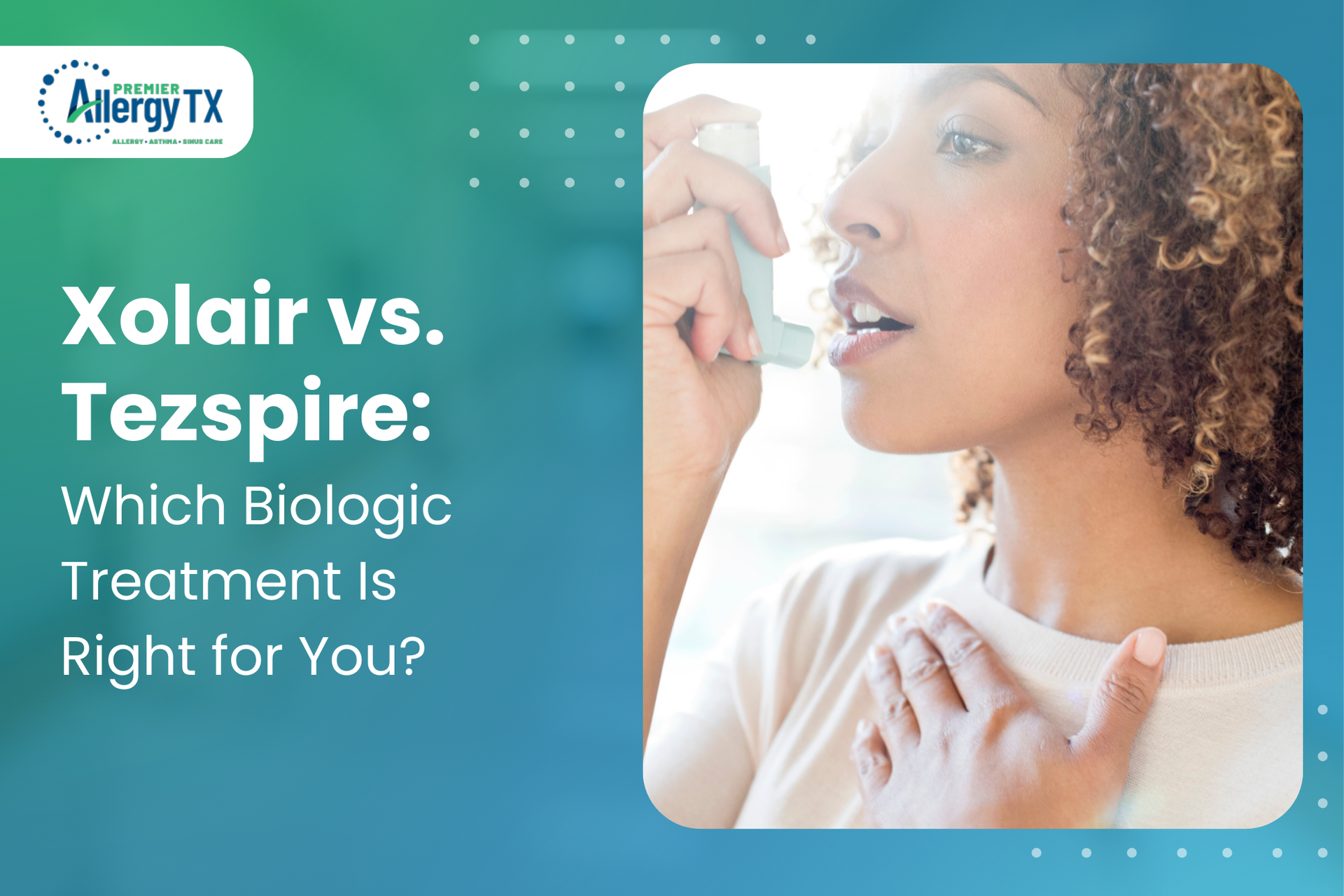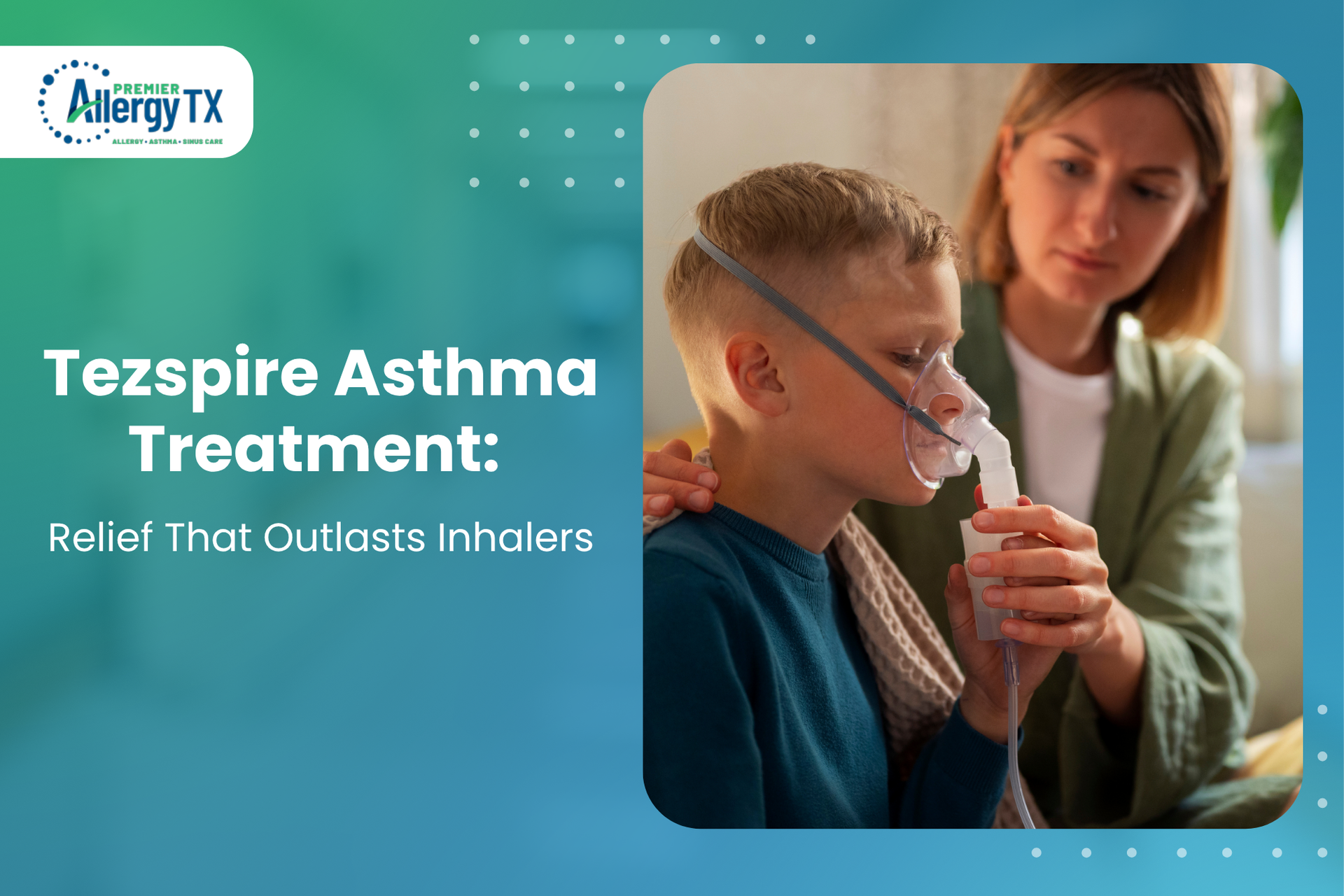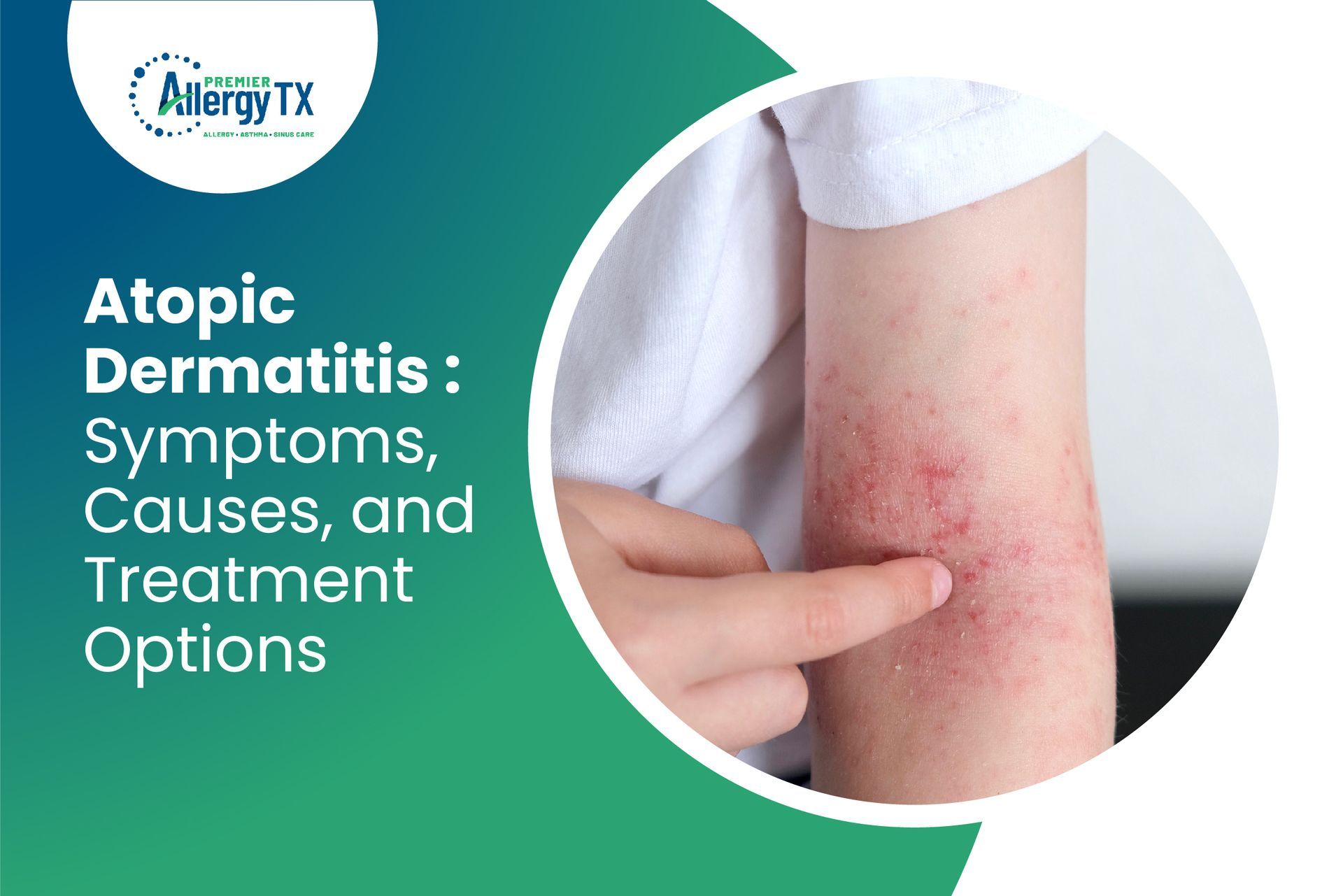If you’ve struggled with severe allergies or asthma, you know how frustrating it can be to chase relief without truly solving the problem. From constant sneezing to asthma flare-ups, allergies are awfully disruptive to daily life. Fortunately, modern allergy treatments have evolved, offering solutions that go beyond symptom management.
Today, options like biologics and oral immunotherapy (OIT) provide hope for those seeking long-term control and even desensitization. Biologics target specific immune pathways to reduce reactions, while OIT gradually trains the body to tolerate allergens safely.
At
Premier Allergy of Texas, we help patients navigate these options with confidence. Let’s break down how biologics and OIT work, explore their benefits, and find out which treatment might be right for you.
Discover the Allergy Solution That Works for You
Understanding Biologics: A New Era in Allergy Care
If you’re looking for treatment that tackles the root of allergic reactions, biologics for allergies could be the answer.
Biologics are medications made from living organisms that target specific pathways in the immune system, helping reduce the overreaction that causes symptoms.
Common biologics include:
- Xolair (omalizumab) – for severe asthma, chronic hives
- Dupixent (dupilumab) – for asthma, eczema, nasal polyps
- Fasenra (benralizumab) – for severe asthma
These work by blocking immune signals (like IgE antibodies) that trigger allergic inflammation, helping reduce flare-ups and improve daily life. Biologics are often used for:
Treatment usually involves in-office injections every two to four weeks. While the benefits like fast relief and better symptom control are impressive, it’s also essential to understand the cost of biologics, as expenses and insurance coverage can vary based on your specific treatment plan.
Understanding Oral Immunotherapy Treatment (OIT): Training the Immune System
Unlike
biologic therapy for allergies, oral immunotherapy trains your immune system to tolerate allergens over time. Patients are gradually exposed to small amounts of allergens (like peanuts, milk, or eggs) under medical supervision, helping the body respond more calmly and reducing the risk of severe reactions.
Here’s how oral immunotherapy treatment is administered:
- Dose increases
are done in-office with careful monitoring.
- Maintenance doses continue at home once the target level is reached.
- Over time, your immune system
learns to tolerate allergens, improving safety and confidence.
OIT is usually recommended for:
- Patients with food allergies
- Some individuals with
allergic rhinitis or environmental allergies
Benefits and considerations:
- Pros:
Potential long-term tolerance, personalized care, and greater control over allergies.
- Cons: Daily dosing, ongoing commitment, possible oral immunotherapy side effects during dose escalation, such as mild mouth itching or stomach discomfort.
Oral Immunotherapy vs. Biologics: Key Differences
Both biologics and oral immunotherapy are effective allergy treatments, but they work in very different ways. Understanding how each approach addresses allergic reactions can significantly impact your ability to manage symptoms and improve your quality of life.
Here’s a clear allergy treatment comparison to help you see how they differ:
In some cases, biologics and OIT can complement each other. For example, biologics may reduce allergic reactions, making OIT safer or more tolerable for certain patients. At
Premier Allergy of Texas, our specialists guide you through choosing allergy therapy that fits your unique needs, lifestyle, and long-term health goals.
Expert Insight and Planning: The PATX Approach
We know every allergy treatment journey is unique. That’s why our clinic offers a full range of allergy treatment options, including biologics and oral immunotherapy, guided by
board-certified allergists who create personalized treatment plans for each patient.
We focus on:
- Safety:
Treatments are carefully monitored to minimize risks.
- Patient education:
You’ll understand how each therapy works and how to manage your allergies at home.
- Evidence-based care:
Recommendations are based on the latest research and best practices.
Your journey begins with:
- Allergy testing to identify triggers
- Personalized treatment planning
- Ongoing follow-ups to track progress and adjust therapy
With
Premier Allergy of Texas, you’re taking an active step toward long-term control and a better quality of life.
Your Personalized Path to Allergy Freedom
Both biologics and oral immunotherapy offer powerful ways to manage allergies and improve your quality of life. When comparing oral immunotherapy vs. biologics effectiveness, the “better” option depends on your specific needs, lifestyle, and allergy type. Understanding the differences and how each treatment works can help you make a choice that fits your life and goals.
With the right guidance from a trusted allergist, you can gain control over your symptoms and feel confident again in your daily life. Schedule a consultation today and take the first step toward long-term allergy relief.
Find the Right Path to an Allergy-Free Life
Frequently Asked Questions
Are there lifestyle changes that improve OIT outcomes?
Consistency is key. Maintaining a regular dosing schedule, monitoring for reactions, and avoiding accidental allergen exposure during dose escalation can help the immune system build tolerance more effectively.
How do I know if I’m a candidate for both treatments?
A detailed allergy evaluation, including testing and review of your history, helps determine eligibility. Factors such as allergy severity, previous reactions, and overall health all play a role in deciding which therapy (or combination) works best.
Can lifestyle or stress affect how well these therapies work?
Yes. Stress, illness, and other environmental factors can influence immune responses. Patients who manage stress well, maintain a healthy routine, and adhere to treatment plans often see better results.
Can children and adults benefit differently from biologics or OIT?
Age can influence which treatment is most suitable. Some biologics have FDA approval for children as young as 6, while OIT protocols often start with younger children for certain food allergies. Your allergist will tailor recommendations based on age and medical history.
















